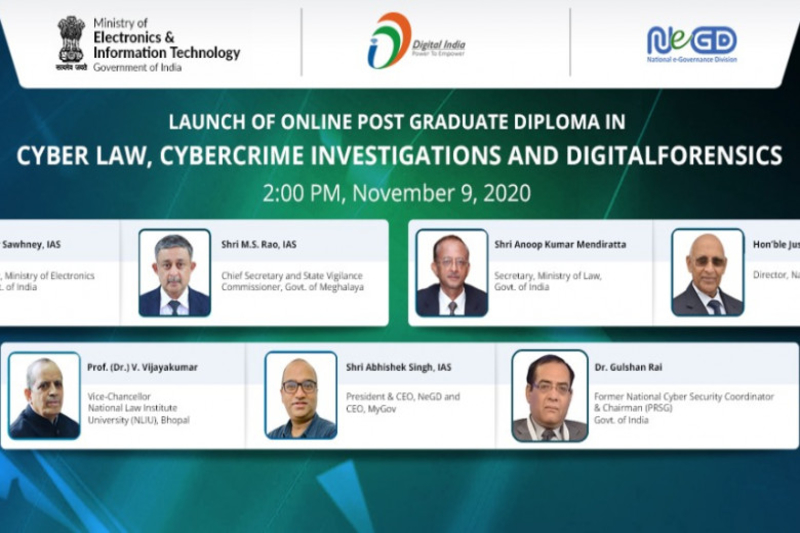
The National e-Governance Division (NeGD), in partnership with National Law Institute University, Bhopal, launched an Online PG Diploma programme on ‘Cyber Law, Crime Investigation & Digital Forensics’ on 9 November 2020.
Hosted on NeGD’s Digital Learning Management System (LMS), the programme is a nine-month online post-graduate diploma course in Cyber Law, Crime Investigation and Digital Forensics.
NeGD’s Learning Management System (LMS), built as part of its Capacity Building Scheme, caters to the needs and requirements of learning and development of government departments envisaged in the National Programme for Civil Services Capacity Building (‘NPCSCB’) – “Mission Karmayogi.”
Falling within the ambit of the Digital India Programme, the course is being offered to 1000 officials in collaboration with NLIU Bhopal. So far, a total of 542 participants has been selected. The programme aims to enable police officers, state cyber cells, law enforcement agencies, prosecutors and judicial officers to acquire the requisite skills to deal with cyber forensics cases efficiently and effectively as per the Indian Cyber Law. The course will also help the participants adopt global best practices, standards and guidelines.
A Cyber Forensics Lab is being established at the National Law University (NLU) Delhi to facilitate this course. Other law schools/ universities like National Law School of India University (Bangalore), Rajiv Gandhi National University of Law (Patiala) etc., will also be involved in the future.
The programme features over 100 hours of content developed by key stakeholders. Commenting on the evolution of the programme, Shri Abhishek Singh, IAS, P&CEO, NeGD, and CEO, MyGov India said it was heterogeneous with participation from judges, officers from police and the customs, judicial and prosecution officers.
Chief Secretary and State Vigilance Commissioner – Government of Meghalaya said that the course will be extremely useful to the Law Enforcement Agencies. He shared there had been an increase of nearly 60% in cyber cases during the pandemic as compared to the period between 2018 and 2019.
One of the positive fallouts of COVID-19, he opined, was an increase in the use of Digital Technology. The flip side to this was that it has led to a rise in the number of cybercrime cases and highlighted the following challenges including fraudulent business transactions, obscene content and defamation and fake news.
Rapid location and identification of cybercriminals was an issue along with a delayed response from service providers. Other problems are a lack of timely information that hampers investigation as well as the location of data in servers outside the country. Knowledge, technology and tools were much needed to cope with increased sophistication in cybercrime. In addition to technologies and capacity building, creating general awareness among citizens were critical drivers for this initiative.
Business dynamics and technology challenges also played a major role in handling cybercrime cases which have been the major drivers in designing the course in collaboration with experts and academia along with NeGD.
Investigational expertise along with well-trained prosecutors and requirement of higher technical education and continuous capacity building of judges was much needed to handle cybercrimes. The course has been designed to maintain the balance of technology and the importance of practical scenarios.
Secretary, Ministry of Law, Anoop Kumar Mendritta emphasised the increased participation of prosecution and judicial officers and the need to move towards Data Investigation from Data Governance to increase in disposal rate. He said that 22% of cases are disposed of due to lack of evidence with high pendency and low conviction rate which requires increased participation. He pointed out that there was a complete mismatch between Investigation and Judicial officers which will be addressed by creating a pool of digital forensic experts and increased academic collaboration.
Secretary-MeitY-Shri Ajay Sawhney, who inaugurated the programme, said that this curriculum is a first-of-its-kind designed after consultation with many experts in collaboration with academia and a state-of-the-art forensic lab playing a role in imparting skillsets to all officers and this was just the beginning of Skill and Capacity Building in Cybercrime in future.
















